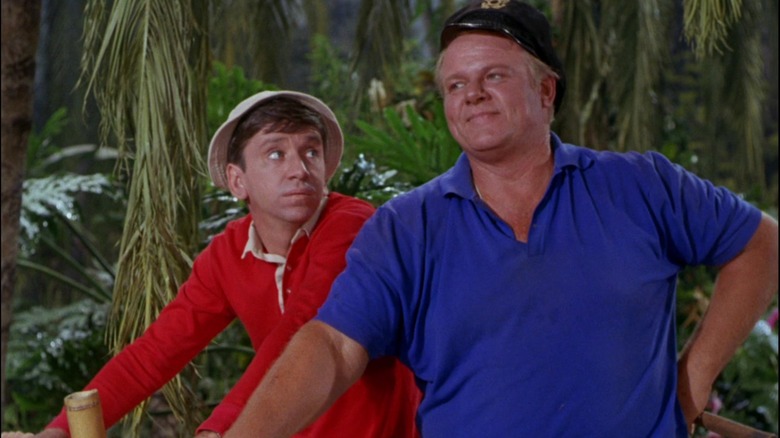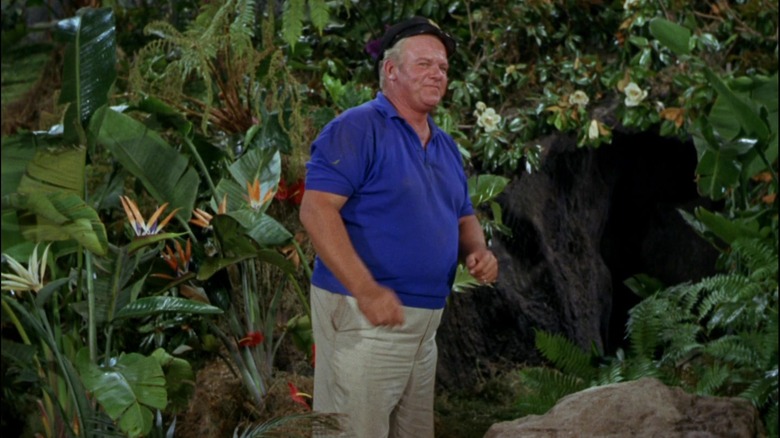Why Gilligan's Island Star Alan Hale Jr. Wasn't Allowed To Lose Weight As The Skipper
When Sherwood Schwartz was creating "Gilligan's Island" back in 1964, he designed the series as one might an animated show. It was meant to be a broad, unrealistic farce, so Schwartz had no issues with making "Gilligan's Island" into something colorful and artificial. The characters, for the most part, wore the same clothes every day, allowing Schwartz to color-code them. Gilligan (Bob Denver) always wore a long-sleeve red shirt and sailor's cap. The Skipper (Alan Hale) always wore blue and wore a captain's hat. The Professor (Russell Johnson) always wore slacks and a white shirt with the sleeves rolled up. Ginger (Tina Louise) may have changed often, but she always wore something glamorous, and her red hair was always highlighted.
What's more, Schwartz seemingly kept a close eye on characters' silhouettes. One of the reasons why The Skipper and Gilligan emerged as such an effective comedy duo was that Gilligan was skinny and meek and the Skipper was rotund and imposing. Hale played the Skipper very carefully, depicting him as temperamental and huggable at the same time. Their physical differences were striking, and evoked the pairing of Stan Laurel and Oliver Hardy, or Bud Abbott and Lou Costello.
When Hale auditioned for "Gilligan's Island," he was about 15 pounds heavier than his average. He would have likely lost the necessary amount of weight to play the role — Hale was a dedicated actor — but in a vintage interview from 1964 printed in the Hartford Courant (handily reprinted by MeTV), he revealed that the producers asked him to retain all the weight he had. Evidently, they liked the Skipper to be a larger guy, feeling it added to the character. Luckily, Hale had no problem with keeping the extra 15 pounds.
Loving the extra 15
Hale's peace with his extra padding was clear. He liked the way he looked, and he was relieved that he didn't have to watch his diet. More than that, though, Hale understood that he was a working character actor, and had rarely been hired to lead Hollywood matinées. Hale's biggest roles, prior to "Gilligan's," came on TV playing the title characters in shows like 1957's "Casey Jones" and 1952's "Biff Baker, U.S.A.," but he more often played supporting characters and comic relief sidekicks.
Hale was at peace with this, loving his craft, and keeping busy. Indeed, a look over Hale's filmography reveals near-constant activity, with the actor taking every job available. If "Gilligan's Island" wanted him to keep a little extra weight, he was happy to do so. Hale said:
"The added weight doesn't bother me. [...] I carry it pretty well and, besides, I can eat as much of anything I want to. [...] The producer of the new series doesn't want me to lose a pound. He says my weight adds weight to my role. [...] I love acting. With me, it's a way of life, but I couldn't care less whether or not I become an actor's actor if you know what I mean. My father was a working actor, not in the least star-conscious. I'll settle for that. As long as there's a job to look forward to, I'm content."
This interview, recall, was given before Hale knew "Gilligan's Island" would become the massive hit that it was. He had no idea that the Skipper would become one of his most recognizable roles. If Hale looked happy on camera, though, it's because he was. It was a lucrative job, and he was allowed to ply his comedic skills with aplomb, not to mention, he didn't have to be on a diet.

